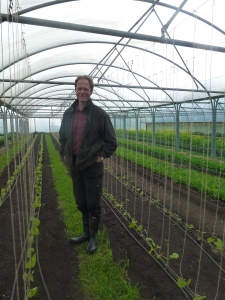It is springtime in North Aston, a little village about eight miles to the south of Banbury. Fierce rain showers pelt down from changeable skies, while florescent yellow rapeseed glimmers in the fields around Mark and Ginny Stay’s vegetable farm, North Aston Organics. Mr. Stay, 49, took me on a tour and explained in great depth the methods and principles involved in their organic business.
Mark, from Sevenoaks, developed a rich horticultural knowledge in Kent before starting up his dream smallholding in 1998 with wife Ginny and third partner Jeremy Taylor. The farm covers about 12 acres, consisting of three sites: a market garden, a field scale area, and a large polytunnel just down the road from the main farm. North Aston Organics grows a wide range of seasonal produce, all the British staples such as potatoes, cabbage and lettuce, but with plenty of surprises too. I saw spring shoots of the humble carrot, but also areas for aubergines and peppers, the germinated seeds of eight varieties of tomato bursting upwards through the soil, and even the robust stalks of an exotic lemongrass plant.
Mark was keen to explain that they try to stretch the seasons as little as possible. No unnatural heating is used so that things grow when they are supposed to grow; he spoke passionately of “the magic of the first taste of the first ‘fruits’ of the season.”
I was told that at the North Aston farm they are not concerned with just being organic for organics’ sake, but with fully embracing the concept for better tasting vegetables, sustainability and the maintenance of natural ecosystems. Certified organic by the Soil Association, Mark wants to convince people of the importance of organic food production. “The perceptions are that organics is an expensive fad. Supermarkets have turned organic food into a niche product. But the price gap is getting smaller and we are trying to get the message across that there are great benefits to organic food. Conventional farming yields to the supermarkets’ demands for long lasting vegetables, while taste is way down the list. Meanwhile, wildlife suffers and water companies have to remove pesticides from the water we drink,” he said.
Mark and Ginny sacrifice one sixth of growing space for cultivating their own green manure. In addition, a range of environmental methods is used for pest prevention. Verges grow tall with nettles, attracting ladybirds which in turn will feed on crop-damaging aphids. Mark told me that he tries to stay close to the forefront of organic developments and is always striving to find new methods of self-sustainability. He is experimenting in his polytunnel with a ‘No Dig System’, relying on worms to drag fertile green compost down and produce water efficient, rich organic matter.
Most of the farm’s trade comes from a home delivery food box scheme. While they believe that the heyday of the food box has come and gone, the couple have been able to diversify and now supply produce for pubs and restaurants. They are also ever-present at the Deddington farmers’ market, and this year they have decided to sell their fresh vegetables outside official market dates. “The market is only on one Saturday per month and it’s hard for our customers to do their weekly shop from this, so we have started setting up in the market square every Saturday. We are trying to meet customers half way and make it a little more convenient for them,” Mark said.
A small, unmanned hut of a shop sits by the entrance to the farm. Bags of newly harvested vegetables nestle inside, and one simply puts the appropriate cash in the tin provided. In many ways this store is representative of what the place stands for – small, local and fresh. On the farm Mark and Ginny aim to sell their produce on the same day as it has been harvested. I took a bag of vibrantly coloured mixed leaves home and can vouch for their quality. The leaves included mustard greens and red chard, powerful flavours that reminded me how much more there should be to our everyday salads than the drab supermarket iceberg.
Mark told me that the vision for the future simply holds a devotion to the same set of principles, with North Aston Organics remaining a proud part of the local economy: “While we want to grow food more efficiently and convince more people to eat fresh, tasty vegetables, we don’t want to expand into the biggest organic farm in Oxford. We want to continue to provide for our local area and grow vegetables in the best way possible. Always wanting everything bigger and better seems just to lead to mass unemployment; we believe small is beautiful.”
This article appeared in the Oxford Times magazine, ‘Limited Edition’ in June, 2012.

